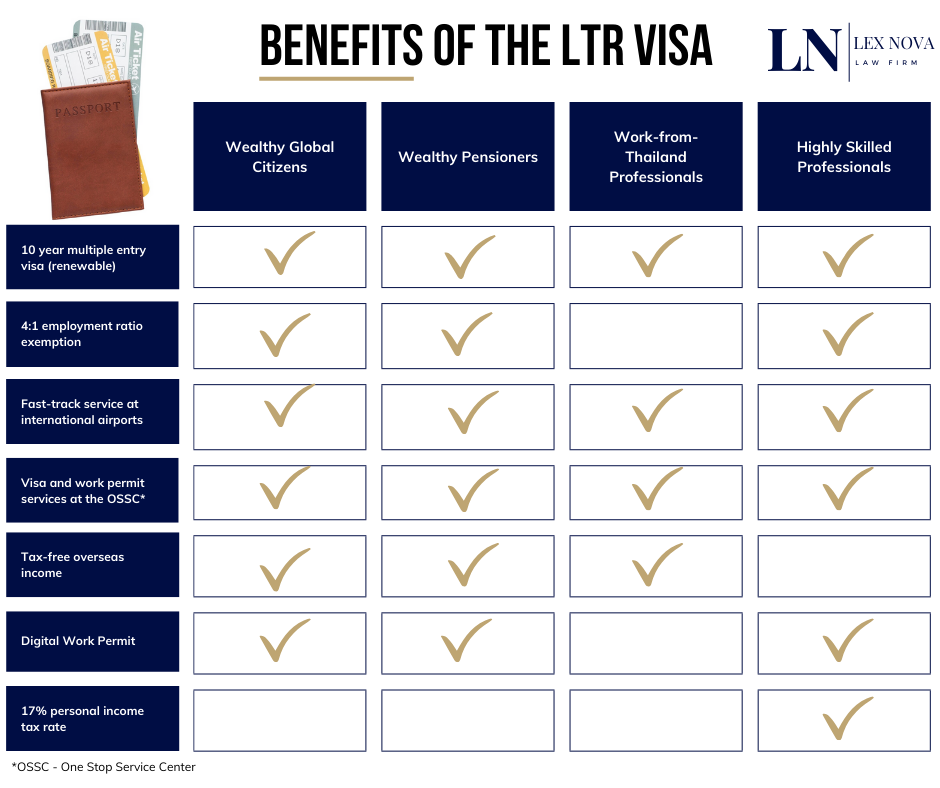Introduction:
The Long-Term Resident (LTR) visa program was introduced as a way to attract and retain high-potential individuals. This visa offers a package of tax and non-tax incentives, along with the necessary work permit, that cater to the needs of professionals, digital nomad communities, and remote workers willing to relocate in Thailand, including those seeking a digital nomad visa.
This blog post will explore the LTR visa for Work from Thailand Professionals in detail, outlining the eligibility criteria, benefits, and application process. Whether you’re considering relocating to Thailand as a digital nomad or expanding your professional opportunities, this guide will provide you with the necessary information to make an informed decision.
Key Points
- The LTR visa, similar to a digital nomad visa, allows skilled professionals employed by well-established overseas companies to work and live in Thailand for 10 years without traditional work permit requirements.
- Applicants must meet minimum income, education, employer criteria, relevant work experience, possess a valid work permit, and health insurance requirements to be eligible.
- Key benefits include 10-year visa validity, tax exemption on overseas income, access to One Stop Service Center, and dependent visas for family members.
- Applicants must first obtain a Qualification Endorsement Letter (QEL) from the Board of Investment (BOI) before applying for the LTR visa.
What is the LTR Visa for Work from Thailand Professionals?
The LTR visa for Work from Thailand Professionals is specifically designed to attract remote workers and the modern digital nomad employed by well-established overseas companies to Thailand. This visa allows skilled professionals and digital nomads to work and live in Thailand without the visa and work permit requirements associated with traditional employment. By removing these burdens, the LTR visa enables holders to easily establish themselves in Thailand.
What is the Difference Between the LTR for Highly Skilled Professionals and the LTR for Working from Thailand?
The LTR (Long-Term Resident) visa in Thailand offers two main categories for foreign working professionals seeking long-term residency in Thailand: the LTR for Highly Skilled Professionals and the LTR for Working from Thailand.
The main differences between both these visas lies in the purpose of the visa:
LTR for Highly Skilled Professionals
This category is designed for highly skilled foreign experts, professionals, investors, and retirees who can contribute to Thailand’s economic and social development.
LTR for Working from Thailand
This category is intended for foreign nationals who want to work remotely for their overseas employer or operate their own business while residing in Thailand.
What are the Eligibility Requirements for the Long-Term Residency Visa for Work From Thailand Professionals?
To be eligible for the LTR visa as a Work from Thailand Professional, applicants must meet the following criteria:
Minimum Income Requirement
Applicants must have earned a personal income of at least $80,000 per year over the past 2 years.
If the applicant’s personal income has been lower than $80,000 but no lower than $40,000 per year over the past 2 years, the applicant is required to:
- Have a master’s or higher degree.
- Own their own intellectual property
- Receive a Series A funding (must not be less than $1 million).
Education Requirement
Applicants are required to have a master degree and/or own intellectual property, or have received Series A funding of at least $1 million.
Employer Criteria
The applicant’s current employer must be a public company listed on a stock exchange outside Thailand, or a private company that has been operating abroad for at least 3 years and earned a revenue of at least $150 million over the past consecutive 3 years.
Relevant Working Experience
The applicant must have at least 5 years of relevant working experience directly applicable to their field of current employment. This experience should have been acquired within the past 10 years.
Health Insurance Requirement
Applicants are required to have a health insurance package with a minimum coverage of $50,000, valid for at least 10 months. Alternatively, applicants can meet the requirement by having a social security package that covers medical treatment in Thailand or a cash deposit of at least $100,000 (or equivalent in other currencies) in Thailand or abroad for at least 12 months prior to the application.
It is important to note that all currency mentioned is denoted in United States Dollars (USD), although applicants can use other currencies when applying as long as the sum is equivalent to the USD value.
What are the Benefits of the Long-Term Residency Visa for Work from Thailand Professionals?
The LTR visa for Work from Thailand Professionals offers several benefits, making it an attractive option for skilled professionals and remote workers. Here are some of the key benefits:
10-Year Validity
The LTR visa provides a 10-year visa that allows professionals to live and work in Thailand without the need for visa renewals.
Tax Exemption
Holders of the LTR visa are eligible for tax exemption on overseas income and a work permit, providing significant financial advantages. Please note, the holders of a Work from Thailand LTR visa are not eligible for the 17% personal Income Tax Rate in Thailand, this is only available to LTR visa holders who applied under the Highly Skilled Professionals route.
One Stop Service Center
Professionals with the LTR visa can apply for immigration and work permit services at the One Stop Service Center, saving time and streamlining the process.
Dependent Visas
LTR visa holders can bring their spouse and children to Thailand on dependent visas, allowing their families to join them in their new home.
Please note, holders of the LTR visa for Working from Thailand, including remote workers, do not require a work permit as permission for staying in Thailand and undertaking remote work for an overseas company has already been granted.

What Documents are Required when Applying for LTR Based on Being a Highly Skilled Professional?
When applying for an LTR visa based on Working from Thailand, applicants must be able to provide the following documentation.
Evidence of Income and/or Investment
Applicants must be able to provide evidence that they have earned USD 80,000 a year for 2 consecutive years. It is important to note that the financial obligations can be satisfied using both active and passive income.
Examples of accepted forms of evidence include:
- Personal income tax returns,
- Bank statements obtained from your bank (showing a deposit no less than USD 100,000 which has been held no less than 12 months from the date of LTR application.)
- Pay slips from your employer
- Documents showing income earned from passive income such as interests, dividends, royalties or rental income etc.
Education Certificate
Applicant must provide the following education certificates:
A. Master Degree or higher
B. Bachelor degree
Please note, if the documents are not English Must be in or a notarized translation into English or Thai language only.
Should the applicant not have a Masters degree, they must be able to provice evidence of a full and complete intellectual property ownership e.g. patents
Work Experience Certificate
Applicants must provide a certificate from their current employers stating that the applicant has been working in the related field for no less than 5 years of the past 10 years.
The certificate must also state:
- The date the applicant started working,
- Contract end date,
- Position,
- Scope of company and,
- Authorised signature from the company.
Employment Contract
A current employment contract with the employer that has been signed by the applicant and the authorizer. This contract must state:
- the start and end date of the contract,
- salary,
- position and
- job description.
Assignment/appointment letter
An assignment/appointment letter will be required to appoint applicants as eligible for remote working in Thailand. The certificate must be authorised and signed by the company and state following:
- the applicants current position,
- termination date of employment (if any) and
- permission for the applicant to work remotely from Thailand
Company Documents
The following documents are required from the Company who employs the applicants:
- Company affidavit,
- business licence(s),
- shareholders list,
- The audited financial statements of the company for the latest financial year, or financial report showing the company’s revenue of more than 150 million USD in the last 3 years OR evidence of being listed on a stock exchange.
- company profile and brochure.
What is the Application Process for the LTR Visa for Highly Skilled Professionals?
To apply for the LTR as a Work from Thailand Professional, the first step is to obtain a Qualification Endorsement Letter (QEL) from the Board of Investment (BOI). The QEL is a mandatory document for the LTR visa application process, as it serves as a formal endorsement of eligibility for the LTR visa program under this category.
To obtain a QEL, applicants must submit an application form and supporting documentation, including their resume, diploma, and employment certificate(s). Once the QEL is granted, it remains valid for 60 days from the date of issuance.
With a valid QEL, applicants can apply for the LTR Visa at a Thai embassy or consulate overseas, or at an immigration office in Thailand. It is advisable to start the application process early, as it can take several months to complete. Ensuring that all required documentation is prepared in advance will help expedite the process. Applicants should also be prepared to answer questions about their work experience and skills, as the BOI may request additional information during the application process.
Once a QEL has been obtained the application process for the LTR visa for Work From Thailand Professional requires completing the following stages:
Application Submission
Applicants are required to register and submit online an application for the qualification endorsement. This will require the applicant to upload all required supporting documents.
Qualifications Endorsement
After the BOI has received all the required documents, the application will be registered and sent for the qualifications endorsement by the relevant government agencies (such as Immigration, Thailand’s Board of Investment, Department of Consular Affairs, etc.).
Applicants will be notified of the result for the qualifications endorsement within 20 working days. Please note that the processing time may take longer if additional documents are required by any of the reviewing agencies.
Please also note that any decision made by the government agency regarding the LTR Visa qualification endorsement result is considered final and binding.
Visa Issuance
Once the application and qualification endorsement has been approved, applicants will be required to submit additional information and documents for the pre-approval process, which takes 1-3 working days (processing time might take longer if additional documents are requested).
Can Holders of the LTR for Work from Thailand Professionals Bring Their Family as Dependents?
Applicants of the LTR for Work from Thailand Professional are also permitted to bring up to 4 family members to Thailand as a dependent of their LTR Visa.
Permitted family members include children under the age of 20 and spouses. Such dependents must be legal family members through marriage, birth, or adoption. Please note, that currently, common law and same-sex marriages are not recognized and therefore unfortunately, spouses in such relationships are not eligible as dependents.
In order for the dependents to be able to join the holder of the LTR visa, the following must be satisfied:
- Each dependent must have health Insurance with a coverage of at least $25,000.
- Only children under 20 are only considered as dependents.
- The main applicant will also have to provide additional documents as proof of their dependent’s relationship to them (e.g. marriage or birth certificate).
Our Thoughts
The LTR visa for Work from Thailand Professionals offers a comprehensive range of benefits and a streamlined application process, making it an excellent choice for skilled professionals seeking a long-term career in Thailand. The tax advantages, extended visa validity, and access to a Digital Work Permit provide professionals with unique opportunities to thrive in Thailand’s vibrant business environment. However, it is important to note that the application process can be lengthy and may require additional documentation or information. Our team of experts is available to assist you throughout the application process, ensuring a smooth and successful experience.



